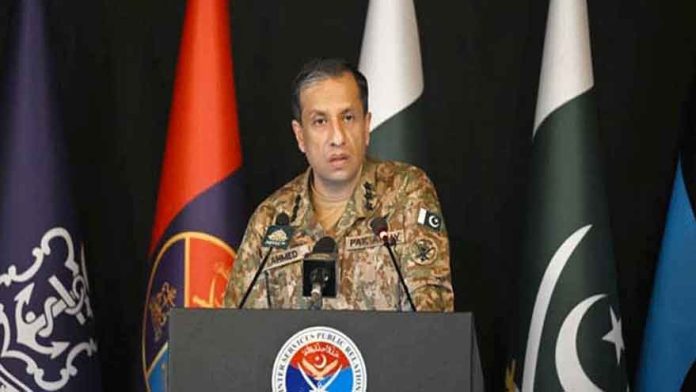Inter-Services Public Relations (ISPR) Director General (DG) Lieutenant General Ahmed Sharif Chaudhry rejected accusations by the Taliban regime that it was behind an overnight airstrike in Afghanistan, state media reported on Tuesday.
“Pakistan has not attacked Afghanistan,” the army’s top spokesperson said in comments carried by the state broadcaster, adding that “the allegations of the interim Afghan government are baseless”.
The statement comes hours after Afghan Taliban spokesperson Zabihullah Mujahid accused the government in Islamabad of carrying out strikes in Khost, Kunar and Paktika provinces, which he alleged claimed the lives of 10 people.
Mustaghfir Gurbuz, a spokesman for the governor of Khost, claimed the strikes were carried out by drones and aircraft.
“The Islamic Emirate strongly condemns this violation and reiterates that defending its airspace, territory, and people is its legitimate right, and it will respond appropriately at the right time,” Mujahid said in a separate statement.
In today’s statement, Lt Gen Chaudhry said that Pakistan conducts all its attacks openly and never targets civilians, clarifying that the country follows clear principles in its responses. “We are a state and respond only as a state.”
The military spokesperson said Pakistan is “against terrorism, not the Afghan people,” and urged the Taliban regime to make decisions like a state.
“The Taliban government should not act like a non-state actor. How long will it remain interim?” he asked. “There is no good or bad Taliban in our view, and there is no distinction among terrorists,” the ISPR DG stated.
He called for an immediate ban on non-custom-paid vehicles, noting that “many terrorism incidents have involved non-custom-paid vehicles.”
The remarks came after a suicide attack on Monday killed three officers and wounded 11 others at the headquarters of Federal Constabulary in Peshawar.
The two nations share a porous border spanning around 2,500 kilometres with several crossing points which hold significance as a key element of regional trade and relations between the people across both sides of the fence.
However, the issue of terrorism remains a key issue for Pakistan which has urged Afghanistan to prevent its soil from being used by groups such as the Tehreek-e-Taliban Pakistan (TTP) to carry out attacks inside the former’s territory.
Islamabad’s reservations have also been confirmed by a report submitted to the United Nations Security Council (UNSC) by the Analytical Support and Sanctions Monitoring Team, which has revealed a nexus between Kabul and the TTP with the former providing logistical, operational and financial support to the latter.
Earlier in the day, Khyber Pakhtunkhwa Inspector General (IG) Zulfiqar Hameed said that initial findings indicate the three militants who attacked the FC Headquarters were likely Afghan nationals.
Speaking to the media, the IG said investigators had gathered crucial evidence, including photographs, fingerprints, and CCTV footage of the suspects. “So far, the investigation suggests that all three terrorists appear to be Afghan citizens,” he said.
‘Faiz Hamid trial’
Speaking about the trial of former spy master Faiz Hamid, the army’s top spokesperson cautioned against speculation, stressing that the legal process must run its course and that any final outcome would be announced immediately once concluded.
“General Faiz Hamid’s trial is a legal matter, and no conjecture should be made,” Director General of the Inter-Services Public Relations (DG ISPR) Lt Gen Ahmed Sharif Chaudhry said during a briefing.
Hamid, who is facing court martial for allegedly engaging in political activities and misuse of authority, rose to prominence when he was heading the counter-intelligence wing of the Inter-Services Intelligence (ISI) in the backdrop of the Faizabad sit-in in 2017.
The ex-ISI chief was taken into custody by the military on charges of abuse of power and violating the Army Act in August 2024.
He had been formally charged with multiple offences, including engaging in political activities and violating the Official Secrets Act under provisions of the Pakistan Army Act in December 2024, according to the ISPR.
The Pakistan Army, following Supreme Court orders, had conducted a detailed inquiry to investigate complaints against Hamid in the Top City case, according to the army’s media wing.
It added that the court-martial process was started against the former spy chief based on these complaints.
It said that multiple instances of violation of the Pakistan Army Act post-retirement had also been established against the former general, who also served as Peshawar Corps Commander.
The arrest was made in connection with a petition filed by Top City housing society’s chief executive officer in the Supreme Court last year, wherein Hamid was accused of land grabbing and stealing valuables from the owner of a private housing society during a raid.
Three more retired officers were also taken into military custody after Hamid’s arrest in connection with the same housing scheme case. –Agencies




